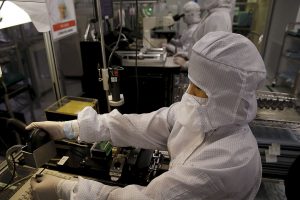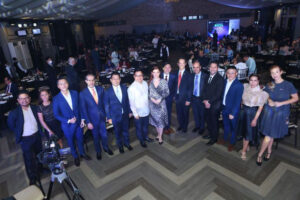PEZA-approved investments decline

THE PHILIPPINE Economic Zone Authority (PEZA) reported a 10% decline in approved investment pledges in the third quarter amid global uncertainties.
In a statement on Sunday, the investment promotion agency said it approved 58 new and expansion projects worth an estimated P17.142 billion during the July to September period, 10.46% lower than the P19.145 billion worth of approved investments recorded in the same quarter last year.
“(The) decline can be attributed to the lower baseline for investments approved last year due to the continuing impact of coronavirus disease 2019 (COVID-19) pandemic and the surging cost of fuel in the global market with the protracted Russia-Ukraine war,” PEZA Officer-in-Charge and Deputy Director General for Planning and Policy Tereso O. Panga said in a Viber message.
PEZA said the new projects are expected to generate $877.807 million worth of exports and create 13,904 jobs.
“Among the approved new and expansion projects, 21 will be for export, 19 for information technology (IT), seven for facilities, and three for tourism,” it said.
The agency also approved eight economic zone (ecozone) development projects in the third quarter as part of efforts to boost countryside development. These include three manufacturing ecozones in Cavite, Batangas, and Pampanga; two IT parks in Iloilo and Davao; and two agro-industrial zones in Iloilo.
In the first nine months, PEZA approved P39.631 billion worth of investments from 148 new and expansion projects, a 22.60% drop from P51.203 billion recorded in the same period last year.
“It is a decline but we were able to narrow down the gap (in the third quarter). We expect more big-ticket projects to register in the last quarter of 2022,” Mr. Panga said.
PEZA also gave the greenlight for 20 big-ticket projects (with a minimum of P1-billion capital each) which will bring in P24.758 billion worth of investments, and generate $654.338 million worth of exports. These projects are expected to create 9,649 direct jobs.
It said Cebu Mitsumi, Inc., Robinsons Land Corp., and TDK Philippines Corp. are among the companies behind these major projects.
“These investments will be into manufacturing of various products, accommodation, real estate activities, office administrative, business support activities among others,” PEZA said.
Despite the year-on-year decline in approved investments, Mr. Panga expressed optimism the agency will still be able to meet its 6-7% investment growth target in 2022.
“We remain bullish that we will be able to achieve our 6% to 7% investments target for the year taking into consideration the firm growth forecasts for 2022 of our winner ecozone sectors at 10% to 15% for IT & Business Process Association of the Philippines (IBPAP) and 10% for Semiconductor and Electronics Industries in the Philippines Foundation, Inc. (SEIPI),” Mr. Panga said.
“These bright outlooks are aligned with the calibrated year-end gross domestic product (GDP) growth for the Philippines at 6.5%- 7.5%, which makes the country among the fastest-growing economies in the region,” he added.
Mr. Panga said that the PEZA is looking into new types of ecozones to entice more investors.
These ecozones include knowledge, innovation, science and technology parks, mineral processing ecozones, renewable energy hubs, aquamarine ecozones, halal hubs, bio-tech centers, defense industrial complexes, and pharmaceutical parks.
“PEZA is eyeing to attract high-tech industries and emerging technologies in the fields of industrial manufacturing transport, technology media and telecommunications, health and life sciences including mineral processing of green metals,” Mr. Panga said.
Also, Mr. Panga said the PEZA is awaiting the guidelines that will allow 100% work-from-home (WFH) arrangement for registered IT-BPO firms.
Last month, the Fiscal Incentives Review Board (FIRB) announced that registered IT-BPO firms can conduct a 100% WFH and still enjoy tax incentives if they conduct a “paper transfer” or shift their registration to the Board of Investments (BoI) from the PEZA.
“As long as we are kept whole with PEZA’s exercise of its regulatory powers, investment facilitation and income-generating functions — together with the IT locators’ enjoyment of flexiwork with incentives regardless of location — we are all for it,” Mr. Panga said.
The PEZA previously sought for a law that will institutionalize hybrid work, especially for IT firms, so that they can have the same footing with BoI-registered business enterprises (RBEs).
“With the interim ‘paper transfer’ arrangement, we hope that it will allow as well for a reregistration mechanism for transferee RBEs in the IT Centers that may want to restore their PEZA status once the enabling law is in place,” Mr. Panga said. — Revin Mikhael D. Ochave




